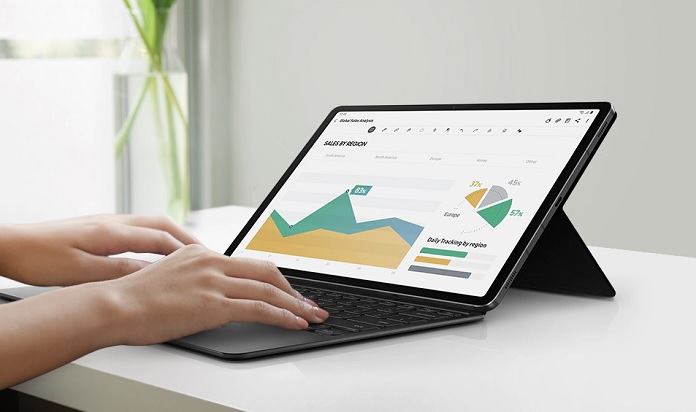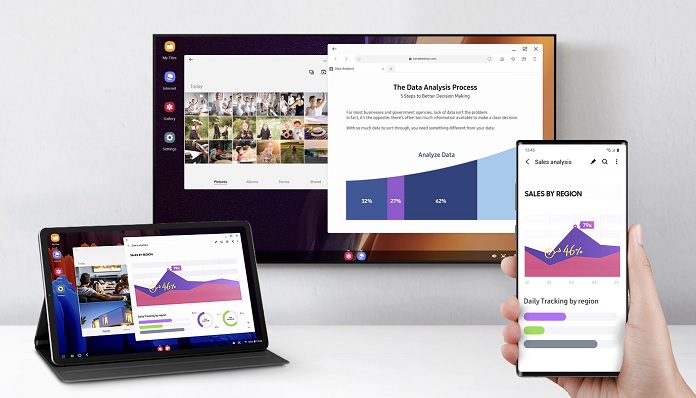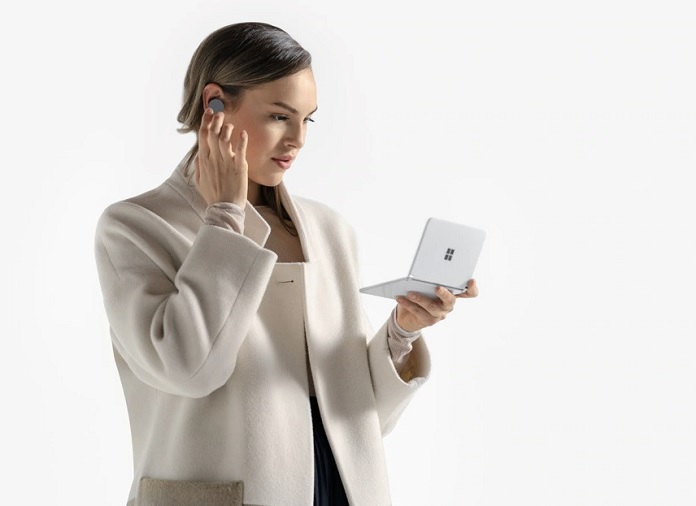Over the years, mobile phones have evolved from basic devices only capable of texting and making calls, to devices that are close to rivalling the desktop. Microsoft has been a key player in this shift. In particular, by launching a laptop that is powered by a smartphone that runs a desktop operating system thanks to the built-in ‘ARM’ chipsets.
Despite not being a viable option for all business users, such devices do appeal to a large segment of this market. Other smartphone manufacturers have seized this opportunity like Samsung with their ‘Dex’ device that can be used in the same way as a desktop PC. Huawei released their device, the ‘Huawei Mate 10’, a phone which can be hooked up to a monitor and connect with Bluetooth keyboards and mice. Similar devices have also been released by manufacturers like ASUS and Sentio.

With Quicker Speeds and Greater Capacity, Phones are Catching Up with their Desk-Based Counterparts
Desktops were once seen as the go-to device for everyone. Now, in large part, mobile devices are somewhat becoming viable replacements for our desktops. Over the years, they have developed massively. Now, they are fast, powerful and portable devices that can be carried anywhere in our pocket and keep us connected 24/7. Thanks to cloud technology, upgraded operating systems and applications, and better battery life, we can work virtually anywhere using our smartphones. Equally, many smartphone models can also be hooked up to screens, keyboards and mice to replicate the desktop experience, with no loss of power.
People that use desktops or mobiles can generally be categorised as either being a ‘producer’ or ‘consumer’. Producers are the people who use their devices every day for creative or business tasks. Think along the lines of programmers, web designers or business analysts. These people demand a desktop device that’s connected to the internet and uses all the right hardware and software.

In contract, there are ‘consumers’ who view the work of producers. For example, senior-level executives or even gamers. These users don’t create content. Instead, they review the work of others. They may browse the web or look at social media. Therefore, they don’t demand expensive desktop hardware or software. Instead, they can complete these types of tasks on a smartphone or tablet. The vast majority of gaming sites now ensure that their games are compatible with fairly simplistic phones/tables, for example, if you play poker games online, the quality of the games won’t differ, even if your device is old and outdated. This has helped to propel mobile gaming to levels it has never been to before. Mobile games are now more accessible than ever before.
So, what’s all this got to do with the current state of things? When mobile devices were brought in, their popularity exploded. In 2017, Android surpassed Windows in terms of usage, while the use of Windows rapidly declined. In other words, it would seem that mobile is the way forward. This is undoubtedly true at the moment. People are definitely favouring mobile thanks to all their features and low price point. However, there will come a time when both markets stabilise. Simply because the work of ‘consumers’ cannot be completed on a smartphone-powered device.
Phones not Yet a Full Rival to Desktops but Quickly Getting there
Although phones aren’t 100% like a desktop PC, they are certainly evolving more closely into one. At the moment, mobile devices are limited to specific applications. While desktops are well set up for power-intensive tasks like managing files, running complex business software, video and image editing. Similarly, desktops also benefit from plenty of HDMI and USB connections, which phones are somewhat lacking. Granted, some mobile devices are compatible with hardware like Bluetooth keyboards and mice. However, not all of them.
This means users are restricted to the cumbersome on-screen keyboard, which can be sluggish and frustrating to use. Storage capacity is something which mobile devices are catching up with. Although, desktops definitely out rule on capacity at the moment. It is drawbacks such as these why you may begin to see why mobiles aren’t a viable desktop replacement for everyone, particularly business users.
It’s true to say that despite iOS being able to run on an iPhone X, Apple isn’t exactly keen for this to happen. They’re quite happy to keep their operating systems separate when it comes to mobile and desktop, and it’s clear to see why (more money for them). The reality is that other manufacturers are making this a reality. The potential for an android phone to transform into a Chromebook is definitely there. Plus, Microsoft has already released a foldable, pen-based tablet running on Windows 10 that has the potential to use peripherals and replace a desktop. Perhaps it’s safe to say that Apple will need to keep ahead, particularly as some of their phones retail for over $1,000.

What could Computers Look Like in the Future?
In the past, mobile phones were something of a basic affair that wouldn’t go beyond sending a text message or sending and receiving a phone call. Now, many of these devices aren’t dissimilar from a PC and have exploded in popularity as a result. Perhaps down to the fact that users can work anywhere they want. Even at home using their existing hardware.
For others, they’ve had to stick with their trusty desktops, as mobiles don’t yet provide the power or functionality they demand. This is the exact reason that both markets are expected to stabilise, despite mobile overtaking desktop at the moment.

The future does look promising. Microsoft has already released its pen-based tablet that runs a full desktop operating system and is compatible with a range of different peripherals. Plus, considering Google integrated the android operating system into their Chromebooks, along with their history of innovation, it’ll be interesting to see if they deliver the goods. Who knows, we might all be running PhotoShop from our mobiles at some point in the near future?